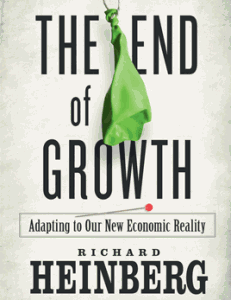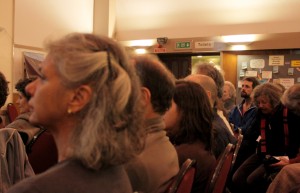12 Mar 2011
Richard Heinberg interviewed in Totnes: “I think 2011 is going to be an interesting year… in the Chinese sense…” Part One
On Richard Heinberg’s recent visit to Totnes, which included a talk on ‘The End of Growth‘, myself, Ben Brangwyn of Transition Network (BB) and Frances Northrop of Transition Town Totnes (FN) did an interview with Richard. Part 2 will appear here tomorrow….
 Welcome to Totnes, lovely to have you here again! The first question is: your new book is about economics and the book before was looking at coal….but in terms of the peak oil question that underpinned your previous books, what’s your assessment of where we are now? Is it still as much a part of your overall analysis as it was….?
Welcome to Totnes, lovely to have you here again! The first question is: your new book is about economics and the book before was looking at coal….but in terms of the peak oil question that underpinned your previous books, what’s your assessment of where we are now? Is it still as much a part of your overall analysis as it was….?
Oh yes, very much so. The new book, The End of Growth makes the case that world economic growth is effectively at an end, both for reasons internal to the world financial monetary system and also for reasons external to the world financial monetary system and the primary factor outside the monetary system is oil. Now in a situation where the system itself – a theoretical situation – where the system itself is relatively stable, (the world financial, political, economic system), it’s I think conceivable that we could still see another year of higher global oil production than we have in the past. There’s certainly no guarantee – I think it’s pretty unclear whether we’re right at peak oil, or just about past it, or just about to get there.
It’s almost academic in a sense because clearly we’re in the peaking period – we’re in that bumpy plateau that everyone knew was going to characterise peak production. But, we don’t have the luxury of a stable global, economic and political situation. So it makes hash of any attempt to try and forecast these things. First of all, we have a very fragile economy that could come apart, almost at a moment’s notice. Then we have the political situation in the Middle East, which is forcing oil prices up and which could in turn cause the economy to come apart at the seams at any moment. So putting all those things together, it’s a very, very volatile situation. I think 2011 is going to be an interesting year… in the Chinese sense…
From that peak oil perspective, there’s always that tension that when you have economic recession it dampens oil demand which then slows down the peak and puts the peak further away. How do you see the interplay between those two things?
Up until just a few weeks ago, the beginning of the revolutions in the Middle East, it still seemed….I wouldn’t say straight forward but at least somehow comprehensible that, as we saw in 2008 the price was bid up to almost £150 a barrel; the economy crashed and that caused demand to decline; the price of oil went down to $35; that caused investment in future oil production capacity to decline. There are basically 3 variables to follow: the price of oil, investment in future oil capacity, and world current production.
You could predict on that basis that maybe we would have gradually increasing demand as the economy begins to recover, especially demand in places like China. Then at some point – maybe 2012, 2013 – demand would exceed production capacity and that would cause prices to be bid up again and then we have more or less a repeat of 2008. But I think the political instability in the Middle East has added a fourth variable to that mix, which is causing the cycle to come sooner than it would otherwise.
 We’re seeing high prices now that are not just a result of extra Chinese demand but are a result of revolutions in Libya and potentially in Bahrain and Saudi Arabia. If that continues, we could see oil prices going through the ceiling – we could see $150 again, even $200 and of course that would immediately cause the economy to crash and then we’d see how far oil prices would fall in that case. They might not fall as much this time if global oil supplies are really seriously constrained. Remember in 2008, there hadn’t been a decline in oil production that caused prices to fall – it was merely a fall in demand. This time we would see a fall in demand but it would be in the context of supply problems, which could be a different situation all together. It could be much worse.
We’re seeing high prices now that are not just a result of extra Chinese demand but are a result of revolutions in Libya and potentially in Bahrain and Saudi Arabia. If that continues, we could see oil prices going through the ceiling – we could see $150 again, even $200 and of course that would immediately cause the economy to crash and then we’d see how far oil prices would fall in that case. They might not fall as much this time if global oil supplies are really seriously constrained. Remember in 2008, there hadn’t been a decline in oil production that caused prices to fall – it was merely a fall in demand. This time we would see a fall in demand but it would be in the context of supply problems, which could be a different situation all together. It could be much worse.
Your new book, The End of Growth, can you summarise what it’s saying, what the central argument is?
Right, well the central argument is that world economic growth is effectively over. It’s hedged a bit by saying of course we are still seeing economic growth in China, India and a few other countries. But I argue in the book that that’s only a temporary phenomenon; that economic growth in China is unsustainable for a number of reasons I outline. One of them of course is that China just doesn’t have enough coal to keep growing its economy.
I make that argument based on factors internal to the international monetary system saying that we’ve reached limits to debt, household debt in the US, and we’re nearing limits to government debt. Not necessarily theoretical, absolute limits but political limits. Many countries just aren’t willing to run up their debt that much further for fear of imperiling their national currency. We have a situation in the US where the federal reserve wants to continue with quantitative easing – pumping more money into the economy – which is the only thing that’s kept the economy going for the past couple of years, but trading partners – Germany, China and others – are reacting to that very angrily saying it’s unfair in terms of global trade; driving down the dollar to make US exports more attractive and so on.
I don’t think a full blown currency war is in the offing but that does act as a kind of constraint on the ability of governments to intervene and prop up consumption any further. Does this mean that we’ve seen the end of economic growth? It think it’s a very big deal given that we have a monetary financial system that’s set up only to function in the context of growth – they way we loan money into existence for example. We no longer base money on precious metals or things like that, we create money by making bank loans, and that means if people aren’t taking up more loans that means the money supply starts to decrease as people pay off existing loans or default on them.
This is essentially what we’re seeing. It’s a system that is virtually designed to fail in the absence of economic growth. The last couple of chapters of the book are outlining what needs to happen if we’re going to avoid a wall of global financial failure. We have to get past that wall in order to deal with all the other problems we have, the financial problem is just one. I think it’s the most immediate, pressing problem that we have because if we don’t get past that, it will be almost impossible to master the political, economic resources to deal with things like climate change and resource depletion and rebuilding our transport infrastructure and reforming our food system and so on.
But we do have to do all those things too – so we have to get past that wall and then we have to do these other things. That’s a tall order! Right now, the governments of the world have no appetite for any of this. If they’re going to do these things it will only be the result of crisis – they’ll be forced to. Meanwhile, that crisis is going to come down on ordinary people and communities. So the last chapter in the book is about what we ordinary people need to be doing to protect ourselves from the worst consequences of all of this unravelling.
One of the questions that was sent in for this interview today via Twitter was: “Sweden has all time growth right now – how can I convince my politicians that something’s wrong?” It’s not like the UK, where the economy is tanking quite hard, but there are still places – like China and India, like you mentioned – where it’s still accelerating.
I haven’t studied the situation in Sweden so I don’t know what growth there is due to. But a country like Sweden can’t completely disassociate itself from the rest of the economy, and as pressure on the Euro and the dollar mounts and as oil prices increase – I think Sweden is going to find itself basically in the same kettle as everyone else.
How to convince politicians of that? Well that’s very difficult because politicians, by their very job description, either have to keep a smiley, happy face on, or they have to attribute the problems to the opposing political party – somehow it’s all their fault. We’re in a situation where it’s everybody’s fault – we’ve all bought into the growth economy. Everybody wants more jobs, more returns on investments, and the only way to get that is with more economic growth. Well, what do we do when there isn’t any more economic growth? Whose fault is that? We all really have to bite the bullet and change our expectation, and change our ways of living.
It is the great taboo with politicians, the great unspoken heresy to publicly question economic growth. I was talking yesterday to someone who discussed zero growth with Ed Miliband, who told her “I’m not a zero growth kind of guy”. Is there any hope that there will be any leadership on this at all from politics?
No, certainly no publicly any time soon. I would like to hope that behind closed doors, there are people in central banks and people in governments around the world who are sort of scratching their heads and going, “well maybe what some of these fringe people like Herman Daly have been saying for years are true – maybe there are limits to growth and we’re starting to smash up against them. Maybe we should have a plan B. Maybe we should figure out, if things get really bad, if they really are right then we should do this and this and this”. So far I haven’t seen any evidence that that’s the case but one would like to hope so. But if that’s not the case then someone needs to be thinking this through and coming up with alternative strategies that could be implemented in a crisis situation.
Speaking of Herman Daly – this is a quick question from Peter Lipman. The steady state idea is envisaged as still being sat within a capitalist system, but the capitalist system itself is founded on growth. How do you see the tension between those two things?
Well I think that’s true. The word capitalism is very tricky – it means different things to different people – and certainly in the US it’s one of those red flag words that sets people off immediately. If you question capitalism then clearly you’re a communist because there are only two alternatives in the world. Nevertheless, capitalism as a system, however you define it, really has come into existence just in the last few of centuries of economic growth based on cheap energy. It has incorporated within itself not just psychological expectations but institutional requirements for continued growth.
 That makes capitalism really problematic in terms of its survival for the future. But frankly there aren’t many other systems around that haven’t done basically the same thing – socialism and communism also require growth in one way or another unless we really start to tinker with the basic mechanics and assumptions in any and all of these systems. I think we have to really go back and reinvent money itself – not as debt-based currency, but as mutual credit clearance systems or something of that sort – where money can appear and disappear as needed, without the requirement of continued interest being paid on loans. If we have a fundamentally different currency then you can still have private ownership of productive capital and the things till works but it doesn’t work the same way that we currently see.
That makes capitalism really problematic in terms of its survival for the future. But frankly there aren’t many other systems around that haven’t done basically the same thing – socialism and communism also require growth in one way or another unless we really start to tinker with the basic mechanics and assumptions in any and all of these systems. I think we have to really go back and reinvent money itself – not as debt-based currency, but as mutual credit clearance systems or something of that sort – where money can appear and disappear as needed, without the requirement of continued interest being paid on loans. If we have a fundamentally different currency then you can still have private ownership of productive capital and the things till works but it doesn’t work the same way that we currently see.
In the analysis that you have in The End of Growth, is idea of the steady state economy something that’s workable?
Well in the end of course, we have to have a steady state economy. It would almost certainly be an economy that’s smaller than it is now, because we’re over shooting earth’s productive capacity. Ultimately we have to have an economy that’s primarily based on renewable resources used at less than rates of natural replenishment; an economy that uses non-renewable resources only as they’re recycled and otherwise at declining rates. We’re so far from that situation today – just miles and miles away from that kind of steady state situation, so we probably have a fair amount of economic contraction to do before we could get to what could be a steady sustainable state economy.
This is another one from Peter – this is a long kind of question based on the work of Kevin Ayres, on energy and economic growth, and Charles Hall’s work on energy return and investment….assuming that we are increasingly in a world of a decreasing energy return on investment in terms of our energy supply, to what degree is Ayres right that growth comes from net energy if we are in a declining return on energy investment world? Does that mean inevitably, like Tainter argues, that social complexity will decline and where will that leave us now?
That’s a wonderful question, but the answer I think is pretty simple – yes! Yes, I think Ayres is right that energy is the real driver of economic growth – it certainly was at the beginning of the cycle. And yes, Charles Hall is right that the total net energy yield for all energy sources to industrial societies is declining as we shift from fossil fuels to alternatives – fossil fuels themselves are also seeing a decline in net energy yields.
So where does that leave us? Does that mean we can’t support the current levels of societal complexity? Yes I think that’s right. And this isn’t in the question, but Tainter has said recently that there’s no example in history of a society deliberately and methodically reducing its complexity without collapse. That’s kind of a bracing conclusion to face. I hope that we can be the first society to buck that trend… but the odds are against us. I think the strong likelihood is that we will have some level of collapse, at least in most societies around the world. It’s just a question of what that collapse looks like and what’s left afterward. The more effort we can put into building economic and other infrastructure now that would survive the collapse and work for us in a post-collapse situation, the better off we’ll be.
How do you see the differences between Europe and the US? There’s a much stronger, survivalist meme in the US in terms of these things, and the whole very purist ideal of self-sufficiency. Do you have any thoughts about how that might move to a more collaborative approach and what’s your sense of the cultural differences between the UK and the US?
Well, there are so many pretty big challenges on both sides of the Atlantic. But Europeans at least have more of a collaborative tradition and there’s more of a sense of history in the built infrastructure from the time before fossil fuels and so on, more for people to go back to. In the US, a lot of that pioneer spirit really is directly attached to automobiles and guns – a sense of entitlement to being able to go off on your own and do what you want to do; everyone else be damned. That’s not going to be very helpful in the situation that we’re facing I’m afraid. As an American I despair sometimes at the prospects of much of the country in times of economic turmoil – we’re just not set up for it psychologically. I wish I could say something cheerful!
One of the things that’s been touted a lot recently has been shale gas and how that’s going to totally unlock this whole new layer of cheap energy that we can just run everything on liquid fuels made from gas and there’s hundreds of years worth of gas available now. What’s your take on shale gas as a game changer or not?
The application of the technology is new enough that it’s hard to draw hard and fast conclusions. But I think there are some strong warning signs that fracking extraction methods are environmentally problematic – there are some strong warning signs there – but also probably a lot more costly and less economic than we’re being told. Regular natural gas production has a surprisingly low energy return on energy investment – I was really quite shocked to see the figures from Charles Hall.
I anticipated it would be somewhere up in the same range as coal or certainly regular conventional oil production, but it’s actually considerably less – around 16:1, something like that; around the same as wind turbines in fact. But if you start adding in the technology for fracking, the need to truck in huge amounts of water, chemicals and sand, and inject them into the land with explosives and horizontal drilling – all this is very energy intensive, it’s resource intensive. It has to lower the energy return on investment very substantially.
My guess is that at the end of the day, fracking is going to be seen as a kind of bubble in the economic sense. A lot of investment has been going in to it, and the companies that are specialising in gas fracking have really been subsisting on attracting investment rather than subsisting from income from production. Just recently we saw Chesapeake Energy, (one of these companies that specialises in fracking), selling off one of the company’s stakes. Now why would that be if they were finding this profitable?
It suggests that they’re running out of investment capital and trying to make up for that now by selling off some of what would be their future income. That’s worrying in itself. We’re actually producing a report – David Hughes, the Canadian geologist is leading a study in shale gas that the Post Carbon Institute’s going to be publishing later this year.
In Powerdown, you have your four scenarios: collapse, waiting for the magic elixir, power down and last one standing. Do you still see those as being the four key scenarios? Have you revised those at all?
 I haven’t revisited that in any systematic way – I think David Holmgren has tweaked those scenarios a bit and has come up with a different set that’s at least as useful as the ones I’ve put forward. Clearly, governments of the world still appear to be on the track towards ‘Last One Standing’. Clearly, ‘Powerdown’ is the best way forward on a collective basis and clearly, ‘Building Lifeboats’ is not a bad idea – to the extent that one is not just going about that in a survivalist frame of mind but on a community basis of building some kind of collective infrastructure for survival and renewal and not just heading for the hills. I don’t think there’s much of a future for our species in terms of individual survivalism.
I haven’t revisited that in any systematic way – I think David Holmgren has tweaked those scenarios a bit and has come up with a different set that’s at least as useful as the ones I’ve put forward. Clearly, governments of the world still appear to be on the track towards ‘Last One Standing’. Clearly, ‘Powerdown’ is the best way forward on a collective basis and clearly, ‘Building Lifeboats’ is not a bad idea – to the extent that one is not just going about that in a survivalist frame of mind but on a community basis of building some kind of collective infrastructure for survival and renewal and not just heading for the hills. I don’t think there’s much of a future for our species in terms of individual survivalism.
Tom A
14 Mar 12:09pm
Where can I buy the hat that Richard is wearing in the 2nd photo?
Rob
14 Mar 12:27pm
It is the Totnes new age community showering him with light….
Anna
14 Mar 1:47pm
More like showering him with an upside down wok
adrienne
16 Mar 12:17am
Mebbe it’s a halo?
Paul
25 Mar 9:09am
I thought it was a tin-foil hat there for a moment!